Xingcun Industrial Zone,HaiyangCity, Shandong, CHINA. +86-13864846995 [email protected]

Workbenches on wheels are changing how people set up shop in workshops and garages everywhere. These mobile units come equipped with heavy duty casters so workers can move tools around during projects without stopping what they're doing. The swivel casters let folks maneuver around stuff blocking their path, and those bigger wheels (usually between 4 and 6 inches) actually do a decent job rolling over all the bumps and cracks found in most garage floors. A recent survey from 2023 showed something interesting too: nearly two thirds of mechanics reported finishing jobs faster simply because they didn't have to keep walking back and forth to fixed workstations throughout the day.
| Caster Type | Best For | Load Capacity | Locking Mechanism |
|---|---|---|---|
| Swivel Casters | Tight spaces | 150-200 lbs | None |
| Locking Casters | Precision tasks | 250-400 lbs | Brake pedal/lever |
Locking casters prevent unwanted movement during detailed tasks like metalworking, while swivel models excel in cramped environments requiring frequent repositioning. Leading manufacturers now offer hybrid systems with automatic brake engagement when stationary, enhancing both safety and efficiency.
Industry analysis shows mobile workstations reduce tool retrieval time by 34% in busy garages handling simultaneous repairs. Technicians report 27% fewer workflow interruptions when using workbenches equipped with modular tool storage systems that move with the project.
Durability outweighs price for professionals selecting casters, with 87% citing bearing quality as their primary concern. Polyurethane wheels dominate the market (72% adoption rate) due to their 8-10 year lifespan - more than double that of traditional rubber alternatives (3-5 years).
Match caster specifications to your primary tasks:
Weight distribution is critical—aim for a 60/40 front-to-rear balance to ensure stability during transport.
Workbenches these days come with telescoping legs or hydraulic lifts that let users adjust heights anywhere from 28 inches all the way up to 42 inches. These adjustable benches handle just about any job out there, whether someone is fixing delicate electronic components or working on big wood projects. According to research published last year in Ergonomics in Workshop Tools, workers who use these adjustable stations experience around 29 percent fewer repetitive strain injuries than those stuck at fixed height benches. Plus, getting into the right position matters a lot when doing things like drilling holes or cutting materials where proper alignment makes all the difference.
Foldable designs with wall-mounting capabilities conserve up to 80% of floor space in compact areas like single-car garages. Urban makerspaces using these configurations report 22% faster workspace turnover, as documented in the 2024 Urban Workshop Efficiency Report analyzing 12 shared DIY facilities.
| Material | Average Weight | Max Load Capacity | Ideal Use Case |
|---|---|---|---|
| Aircraft Aluminum | 48 lbs | 750 lbs | Metalworking stations |
| Reinforced HDPE | 32 lbs | 400 lbs | Portable electronics repair |
This balance allows technicians to safely mount bench grinders while maintaining one-handed mobility across zones.
63% of new condo developments now include built-in mobile tool workbench niches, reflecting a 41% year-over-year increase—proving that mobility is becoming essential to creative projects undertaken in tight spaces.
Mobile workbenches are revolutionizing compact workshop setups by offering the ability to reposition with ease. This versatility is crucial for workshops where every foot of space counts. By incorporating vertical storage solutions like wall racks and overhead bins, users can maintain immaculate organization without sacrificing floor space. Despite potential fluctuations in efficiency rates due to variables in workshop setups, reports indicate a 34% decrease in tool retrieval time when using mobile workstations. With lockable wheels, these workbenches can also create flexible and space-saving layouts that adapt to various tasks at hand.
An insightful case study showcases the dramatic impact of mobility on space utilization, as demonstrated by a 15x22' garage transformation. By dedicating mobile workbenches to movable setups, users have been able to reduce setup times by 40% and effectively double their usable workspace. The setup incorporated:
Moving workstations significantly minimizes disruption, enabling workers to switch between tasks efficiently while conserving space. Mobile workbenches eliminate the static 'dead zones' that often surround traditional fixed tables.
When determining whether a fixed or mobile workbench is better suited for your workshop, consider the nature and scope of projects usually undertaken, the importance of mobility and flexibility in the workspace, and available space. Mobile workbenches are indispensable when frequent layout changes and multifunctionality are required.
As the demand for mobility in compact and multi-functional workspaces continues to grow, manufacturers are focusing on innovations like robust materials and efficient energy use. The future of mobile tool workbenches is set to incorporate smarter designs and functionalities, with emphasis on user comfort, sustainability, and high adaptability for varied tasks and environments.
Mobile workbenches offer enhanced mobility, allowing workers to move tools easily during projects without interruption. This flexibility reduces tool retrieval time and minimizes workflow interruptions, increasing efficiency.
Locking casters provide stability during precision tasks by preventing unwanted movement, while swivel casters offer better maneuverability in tight spaces without a locking mechanism.
Match your workbench caster specifications to the primary tasks. For woodshops, opt for 5" lockable wheels with a 330+ lb capacity. For automotive, choose oil-resistant rubber casters with swivel-lock combinations. Prioritize vibration-dampening polyurethane wheels for electronics work.
Mobile workbenches eliminate stationary 'dead zones' by enabling flexible layouts, provide multi-zone workflow capabilities, and include integrated storage solutions. They effectively maximize limited space by reducing setup time and doubling usable workspace.